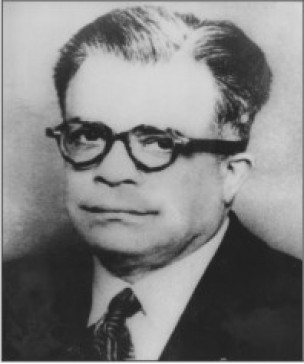B.B. Mundkur

| Name | B.B. Mundkur |
| Designation | Chief Editor |
| Complete postal Address with city code | Indian Phytopathological Society |
| Email IDs | xyz@gmail.com |
| Mobile No. | 123456789 |
Brief Biodata
Balchandra Bhavanishankar Mundkur, Professor of Botany, Poona University, India, died on December 13, 1952, at the age of fifty-six. He was born on June 26, 1896, in Mundkur, a village near Mangalore of the Madras State. After passing the high school examination in 1915, he had his early collegiate education at the St. Aloysius College, Mangalore. Later he studied in the Presidency College, Madras, from where he took B.A. (Hons.) in Botany with a first class and won a 'Gold Medal'. After his brilliant academic career, he was for a short time an Agricultural Officer in Bengal, but from 1922 onward his professional career was solely devoted to Mycology and Plant Pathology. From 1922 to 1928 he worked as Assistant Mycologist in the Cotton Research Scheme at Dharwar (Bombay State) and made a valuable scientific contribution on 'wilt disease' of cotton. This work laid a firm foundation for his future career.
Dr. Mundkur went to U.S.A. in 1929 for post-graduate studies at the Iowa
State College of Agriculture and was awarded the Ph. D. degree in 1931 in Plant
Pathology. Soon after his return he was appointed as Asstt. Mycologist in the
Division of Mycology, Indian Agricultural Research Institute, Pusa, Bihar. He
was associated with the Institution, both in Bihar and later at Delhi till
1947. During his tenure of the post, Dr. Mundkur was a popular figure with
post-graduate students and members of the staff. In the earlier part of his
career, he took a very keen interest in the `Ustilaginales' of India. He also
prepared a supplement to 'Fungi of India' by Butler and Bisby. The numerous
post-graduate students, who worked under him, found him a wise guide and
friendly councillor. He demanded from them the highest standard of scholarship,
technical ability and assiduity. The capacity which Dr. Mundkur possessed to
enthuse his students remains unrivalled. His devotion to his subject was exemplary.
Dr. Mundkur had wide international contacts and possessed a valuable collection
of reprints which he generously handed over to Fergusson College Poona. His
professional advice was sought for avidly by mycological workers all over India
and he never shirked in rendering every possible help to those who needed his
help and guidance. His persistent effort was to raise the status of Mycology
and Plant Pathology in India to that of a major subject in the Indian
Universities and in the Agricultural Institutions. His publication of text book
in 1949 entitled 'Fungi and Plant Diseases' was an endeavour in
this direction.
After his retirement Dr. Mundkur was appointed Professor of Botany and was the first incumbent of this newly created post at Poona University. With his characteristic thormighness he gave his undivided attention to his new assignment and organised excellent laboratory and teaching facilities. His health was rapidly falling and his numerous well-wishers and friends advised him complete retirement and rest. However, in his undaunted zeal to accomplish the work he had undertaken, no amount of advice or persuasion could sway him. He had a heart attack and was confined to nursing home for sometime at Poona. Soon thereafter he visited Delhi and met his numerous friends. His physical state showed ominous signs, but still his enthusiasm was unbounded. While at Delhi, he discussed with the writer the various things which, he thought, needed the attention of Plant Pathologists in India. Future development of Plant Pathology and Mycology in India was foremost in his mind. His end came suddenly at Poona on 13th December 1952 and India lost a Mycologist and Scientist of outstanding ability.
Dr. Mundkur published about 80 papers covering a wide field. His last work `Genera of Rusts' in joint authorship with Dr. Thirumalachar has been well received by Mycological workers and is soon to be published in the form of a book. He was one of the chief sponsors of the Indian Phytopathological Society and its organ `Indian Phytopathology'. But for his inspiring lead the Society could not have come into existence in such a short time. He was twice President of the Society, the Editor-in-chief of its journal and Secretary-Treasurer. He was also connected with many other scientific societies in India and abroad.
Dr. Mundkur was a Fellow of the National Institute of Sciences of India, member of the American Phytopathological society and the Society of the Sigma XI, and in 1951, presided over the Botany Section of the Indian Science Congress Session held at Bangalore.
He acted as a member of Agricultural Mission sent by the Government of
India to Afghanistan in 1939, In 1947, he was the official delegate of
Government of India to the Commonwealth Mycological Conference in London. In
1949, he represented the Government of India on the Rubber Conference held at
Singapore.